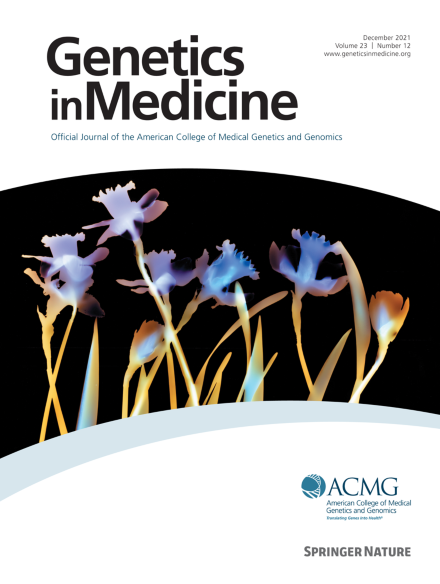基于100,000基因组计划中额外发现的基因组测序返回次要发现的成本和成本效益。
IF 6.2
1区 医学
Q1 GENETICS & HEREDITY
引用次数: 0
摘要
目的:评估使用100,000基因组计划(100kGP)数据从基因组测序(GS)中返回额外发现的成本和成本效益。方法:基于模型的成本效用分析,结合来自100kGP的产量、同意率和成本数据,以及已公布的下游成本估计和在确定致病变异后一生中预计累积的质量调整生命年(QALYs)。结果:在100kGP中,向参与者返回额外发现的成本为710万英镑,即每位参与者81英镑,同意参与者的收益率为0.85%。估计每位参与者的终生增量成本为125英镑,QALYs为0.004,ICER为28,830英镑。在支付意愿阈值为2万英镑的情况下,实施返还额外发现的政策不太可能具有成本效益(即13%)。如果每个参与者返回调查结果的短期成本为43英镑或更低(基本情况为81英镑),则ICER的成本将低于2万英镑。或者,通过将AFs返回给年轻患者群体可以提高成本效益。结论:对这组疾病进行GS后返回的其他发现可能不是一种具有成本效益的医疗系统资源使用方法。我们的成本效益结果依赖于已公布的估计,并应通过长期随访数据进行验证。本文章由计算机程序翻译,如有差异,请以英文原文为准。
Costs and cost-effectiveness of returning secondary findings from genomic sequencing based on the return of additional findings in the 100,000 Genomes Project
Purpose
To assess costs and cost-effectiveness of returning additional findings from genome sequencing using data from the 100,000 Genomes Project (100kGP).
Methods
A model-based cost-utility analysis combining yield, consent rates, and cost data from the 100kGP with published estimates of downstream costs and quality-adjusted life years expected to accrue over a lifetime, after the identification of a pathogenic variant.
Results
The cost of returning additional findings to participants in the 100kGP was £7.1m or £81 per participant, with a yield of 0.85% for consented participants. The estimated lifetime incremental cost per participant was £125 and quality-adjusted life years 0.004, giving an incremental cost-effectiveness ratio of £28,830. Implementing a policy of returning additional findings is unlikely to be cost-effective (ie, 13%) at a willingness-to-pay threshold of £20,000. A short-term cost of returning findings of £43 per participant or lower (compared with the base case of £81) would result in an incremental cost-effectiveness ratio of less than £20,000. Alternatively, cost-effectiveness may be improved by returning additional findings to younger patient populations.
Conclusion
Return of additional findings following genome sequencing for this group of conditions may not be a cost-effective use of health care system resources. Our cost-effectiveness outcomes rely on published estimates and should be validated through long-term follow-up data.
求助全文
通过发布文献求助,成功后即可免费获取论文全文。
去求助
来源期刊

Genetics in Medicine
医学-遗传学
CiteScore
15.20
自引率
6.80%
发文量
857
审稿时长
1.3 weeks
期刊介绍:
Genetics in Medicine (GIM) is the official journal of the American College of Medical Genetics and Genomics. The journal''s mission is to enhance the knowledge, understanding, and practice of medical genetics and genomics through publications in clinical and laboratory genetics and genomics, including ethical, legal, and social issues as well as public health.
GIM encourages research that combats racism, includes diverse populations and is written by authors from diverse and underrepresented backgrounds.
 求助内容:
求助内容: 应助结果提醒方式:
应助结果提醒方式:


